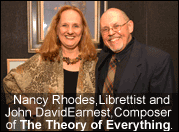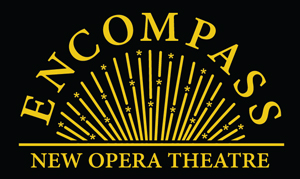Notes from The Theory of Everything
by Librettist Nancy Rhodes
Physics and science have been interests of mine since childhood, inspired by long walks through nature with my grandfather,
a physics teacher. He taught me how to observe and analyze, to appreciate the invisible forces, and unleashed in me an
insatiable curiosity to explore the grand design of our universe.
 In 1987, I read an article in The New York Times about an astounding new physics theory postulating the simultaneous
existence of at least ten dimensions, known as superstring theory. Pushing the envelope of the mind to embrace multiple
dimensions, sister universes, and the possibility that everything from our bodies to the farthest star, is made up of
vibrating strings, fascinated me. In 1987, I read an article in The New York Times about an astounding new physics theory postulating the simultaneous
existence of at least ten dimensions, known as superstring theory. Pushing the envelope of the mind to embrace multiple
dimensions, sister universes, and the possibility that everything from our bodies to the farthest star, is made up of
vibrating strings, fascinated me.
During this time I was working in different countries; while riding on trains, I read metaphysical literature, Eastern
philosophy, science, and poetry. Turkey was one of the places that resonated deeply within me, the ancient city of Ankara
with its Hittite Museum, and Istanbul, the crossroads of Europe and Asia. I found layers of history everywhere, sensed
ancient voices, as I walked through the ruins of Ephesus.
Upon returning home, it came to me in the middle of the night: Act I, Scene 1, a Planetarium. Thus began The Theory of
Everything. The story revolves around the lives of 8-year-old Cassy, her mother Rachel, a documentary filmmaker, and her
father Tomás, a quantum physicist from Brazil. A series of dramatic events catapault a scientific and metaphysical search
into other dimensions and alternate universes.
Further research led me to the writings of physicist David Bohm and his ideas of a holographic universe, to Native American
spiritual conferences, healing seminars, and the laboratories of physicists at Columbia, CUNY, and Princeton.
|


 In 1987, I read an article in The New York Times about an astounding new physics theory postulating the simultaneous
existence of at least ten dimensions, known as superstring theory. Pushing the envelope of the mind to embrace multiple
dimensions, sister universes, and the possibility that everything from our bodies to the farthest star, is made up of
vibrating strings, fascinated me.
In 1987, I read an article in The New York Times about an astounding new physics theory postulating the simultaneous
existence of at least ten dimensions, known as superstring theory. Pushing the envelope of the mind to embrace multiple
dimensions, sister universes, and the possibility that everything from our bodies to the farthest star, is made up of
vibrating strings, fascinated me. 